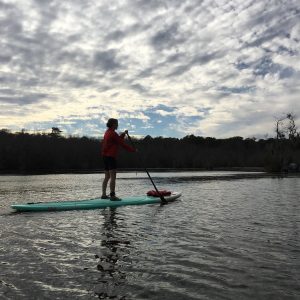 My name is Judith E. Rosenbaum and I am a Professor of Media Studies and Chair of the Department of Communication and Journalism at the University of Maine. I also serve as the Associate Dean of Faculty Development and Administration for the College of Liberal Arts and Sciences. I received my PhD from the Radboud University Nijmegen in The Netherlands.
My name is Judith E. Rosenbaum and I am a Professor of Media Studies and Chair of the Department of Communication and Journalism at the University of Maine. I also serve as the Associate Dean of Faculty Development and Administration for the College of Liberal Arts and Sciences. I received my PhD from the Radboud University Nijmegen in The Netherlands.
Prior to joining the faculty at the University of Maine, I worked as an Associate Professor of Mass Communication at Albany State University in Albany, Georgia. At Albany State University, I served as Faculty Senate President as well as Chair of the Institutional Review Board.
I have taught both undergraduate and graduate students, and have taught courses on the theoretical foundations of mass communication, digital media, research methods, strategic communication, race, gender and the media, as well as several production courses. My research interests include media selection and enjoyment, meaning making in social media, and health and media usage.
My latest book is a textbook on Computer-mediated communication, co-authored with John C. Sherblom. Geared toward undergraduate and graduate students, we discuss five approaches to understanding the influences of technologically mediated communication on our interpersonal and personal relationships. “Computer-mediated communication: Approaches and perspectives” comes with an active learning component and is available from Cognella.
In 2020, I published, “Twitter, the public sphere, and the chaos of online deliberation”, co-edited with Gwen Bouvier, available from Palgrave McMillan. This books presents eleven case studies which examine the different ways in which people utilize Twitter to discuss politics, providing new insights in the platform’s ability to facilitate the kinds of interactions vital to democracy. The eleven chapters present work by a variety of scholars who rely on quantitative, qualitative, and critical/cultural methodologies to examine the nature of debate and communication on Twitter.
In 2018, I wrote “Constructing digital cultures: Tweets, trends, race, and gender”, published by Lexington books. Constructing Digital Cultures examines how user-generated narratives on Twitter renegotiate dominant ideas about gender and race. Using an in-depth, qualitative examination of individual tweets, the different kinds of dialogue that characterize the platform, and various ways in which people connect, Constructing Digital Cultures provides insight into the nature of digital culture produced on Twitter and the platform’s potential as a virtual public sphere. This volume investigates arenas of discussion often seen on Twitter—from entertainment and popular culture to politics, social justice issues, and advertising—and looks into how members of ethnic minority groups use and relate to the platform.
In March 2025, I served as a panelist on an episode of Maine Calling that addressed how the social media landscape had changed in the past five years. The episode can be found here.
In October 2024, I served as a panelist for one of Fogler’s Library Salon talks. This salon talk centered on social media, mental health, and how to navigate difficult situations on- and offline. Fellow panelists included Elizabeth Depoy (Disability Studies and Social Work). Stephen Gilson (Disability Studies), and Cassandra Rowan (Doctoral Student in Clinical Psychology and Intern at UMaine’s Counseling Center).
In September 2024, I participated in an episode of Maine Calling on “the need for nuance.” Together with Professor Kruglanski, I discussed how communication has changed with the advent of digital media and the impact that this has had on political polarization.
In April 2024, I received the Outstanding Faculty Award for Research and Creative Engagement from the College of Liberal Arts and Sciences.
On April 29, 2024, I organized a workshop on media literacy, misinformation, and climate change for K-12 educators as part of the Ecology School’s educational program in southern Maine.
In January 2024, I held a workshop for the Maine Conservation Voters on climate change and misinformation. In this lunch and learn I discussed what misinformation is, how to check the veracity of information one can find online, and how to identify reliable sources of climate change information.
In May 2023, the research on identity shift and brand engagement Benjamin Johnson and I carried out was featured by the University of Florida’s College of Journalism and Communications. You can find the article here.
In March 2023, I gave the keynote for the annual conference of the Connecticut Association for Adult and Continuing Education in Groton, CT. The keynote, entitled “community-building and dialogue on social media: Examining democracy in the 21st century,” addressed the threat and opportunities presented by social media platforms. More information about the keynote and the conference can be found here.
In February 2023, I was a call-in guest to an episode of Maine Calling focused on moving to Maine and why Mainers insist on using “from away” to describe those from outside the state. You can listen to the episode here.
In January 2023, I was a guest on an episode of Maine Calling. In this episode, we talked about how to find common ground in polarized times. The episode can be found here.